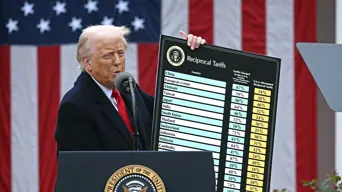Some economists believe SA will have hard time adapting to new US tariffs
On Wednesday, the White House announced global import taxes targeting multiple countries, with South Africa slapped with a 30% reciprocal tariff.

US President Donald Trump delivers remarks on reciprocal tariffs as US Secretary of Commerce Howard Lutnick holds a chart during an event in the Rose Garden entitled "Make America Wealthy Again" at the White House in Washington, DC, on 2 April 2025. Picture: Brendan SMIALOWSKI/AFP
JOHANNESBURG - Some economists believe South Africa will have a hard time adapting to the United States' newly imposed tariff on imports.
On Wednesday, the White House announced global import taxes targeting multiple countries, with South Africa slapped with a 30% reciprocal tariff.
While there are suggestions that countries like China and the United Kingdom will find alternative strategies, there is doubt that Pretoria will manage to do the same.
ALSO READ: Presidency concerned about new Trump tariffs
Analyst Khaya Sithole said that South Africa may have to think twice before imposing retaliating tariffs on the United States.
"If we add 30% of wine exports because Trump has done the same to South Africa, the first thing that happens is that American consumers will look for local alternatives. And if there are alternatives to wine, then they'll simply buy those because yours has become more expensive. This means the wine exporters of South Africa will pay the price. So, it's not a clear or linear process. Some countries will be able to do it a bit better than others and some will decide not to do it all."
Political economist Dale McKinley said that despite the US triggering a trade war, the impacted countries would likely develop alternative strategies.
"It will have a negative impact, but countries are not paralysed. The European Union is already preparing countermeasures, China will do the same, and many other countries will find alternative markets to the USA and band together to protect their own markets. The United States started a trade war, they're the biggest boy in the room, and that’s going to hurt but it's not going to be a one-way street."